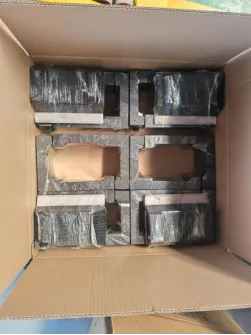Flexible Cable Conduit Options for Enhanced Protection and Organization of Wiring Systems
Understanding Corrugated Cable Conduit Benefits and Applications
In the world of electrical installations and cable management, the choices we make can significantly impact safety, efficiency, and longevity. One such option is the corrugated cable conduit, which has gained popularity due to its unique design and robust features. This article delves into the characteristics, benefits, and applications of corrugated cable conduits.
What is Corrugated Cable Conduit?
Corrugated cable conduit is a type of protective tubing designed to house and protect electrical wires and cables. Its structure consists of a series of ridges and grooves, which gives it a flexible, yet sturdy characteristic. Generally made from materials like PVC or LDPE (Low-Density Polyethylene), these conduits are engineered to withstand various environmental factors, such as moisture, heat, and physical impact.
Benefits of Corrugated Cable Conduit
1. Flexibility and Ease of Installation One of the primary advantages of corrugated cable conduits is their flexibility. Unlike rigid conduits, they can easily bend around corners and obstacles, making them ideal for complex installations where space is a concern. This feature significantly shortens installation time and reduces labor costs.
2. Durability and Protection The corrugated design provides enhanced resistance against mechanical damage, moisture ingress, and ultraviolet light exposure. This durability ensures that the cables housed within the conduit remain safe from adverse conditions, thereby extending their lifespan and maintaining performance.
3. Lightweight Design Corrugated conduits are generally lighter than traditional conduit options. This lightweight nature contributes to easier handling during installation, reducing wear and tear on laborers and minimizing transport costs.
4. Enhanced Electrical Safety By providing a protective sheath for electrical cables, corrugated conduits help prevent short circuits and electrical fires, thereby enhancing overall safety. They are often used in conjunction with other protective systems, forming a comprehensive safety protocol for electrical installations.
5. Environmental Resistance Many corrugated conduits are manufactured to be resistant to various environmental factors, including chemicals, moisture, and extreme temperatures. This makes them suitable for both indoor and outdoor applications, including industrial and commercial settings.
corrugated cable conduit

Applications of Corrugated Cable Conduit
Corrugated cable conduits are utilized across a wide range of sectors, including
- Residential Wiring In homes, corrugated conduits protect wiring systems that run through walls, attics, and basements, shielding them from physical damage and environmental factors.
- Commercial Buildings In commercial applications, the flexible nature of corrugated conduits makes them an excellent choice for complex wiring layouts, such as in office buildings or retail spaces.
- Industrial Settings Industries often operate in harsh environments. Corrugated conduits offer the durability required to protect cables in manufacturing facilities, warehouses, and outdoor installations.
- Telecommunications The telecommunications industry recognizes the importance of protecting sensitive cables. Corrugated conduits safeguard these lines from environmental hazards and physical stress.
- Automotive and Transportation In vehicles, corrugated conduits are commonly used to protect wiring that connects various electronic components, ensuring reliability and safety during operation.
Conclusion
In conclusion, corrugated cable conduits are an essential component of modern electrical installations. They offer a combination of flexibility, durability, and protective qualities that make them ideal for a variety of applications. As technology advances and our reliance on electrical systems grows, the significance of effective cable management solutions like corrugated cable conduits is set to increase. By choosing the appropriate conduit for your electrical wiring needs, you can ensure safety, efficiency, and longevity in your installations.








